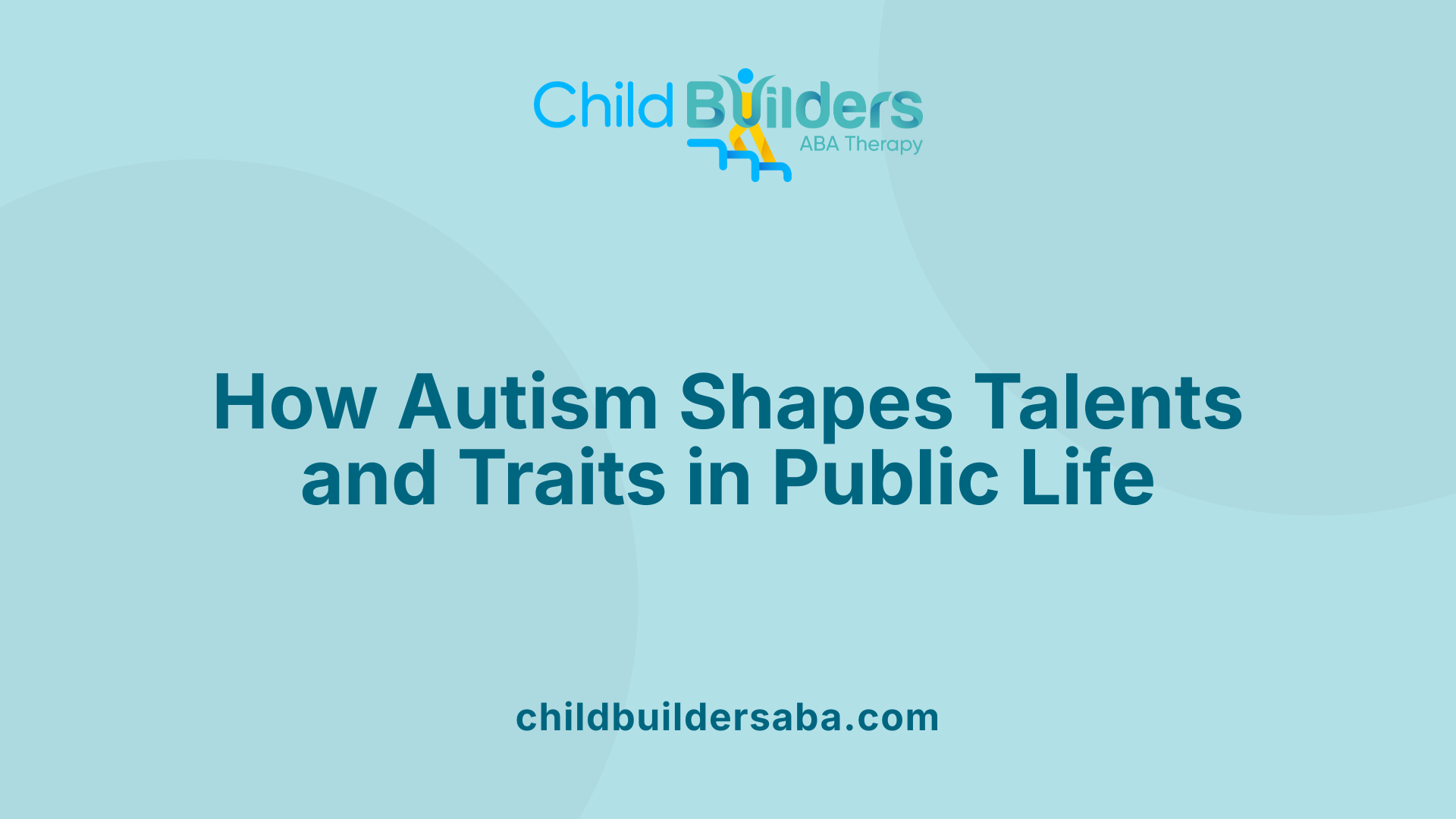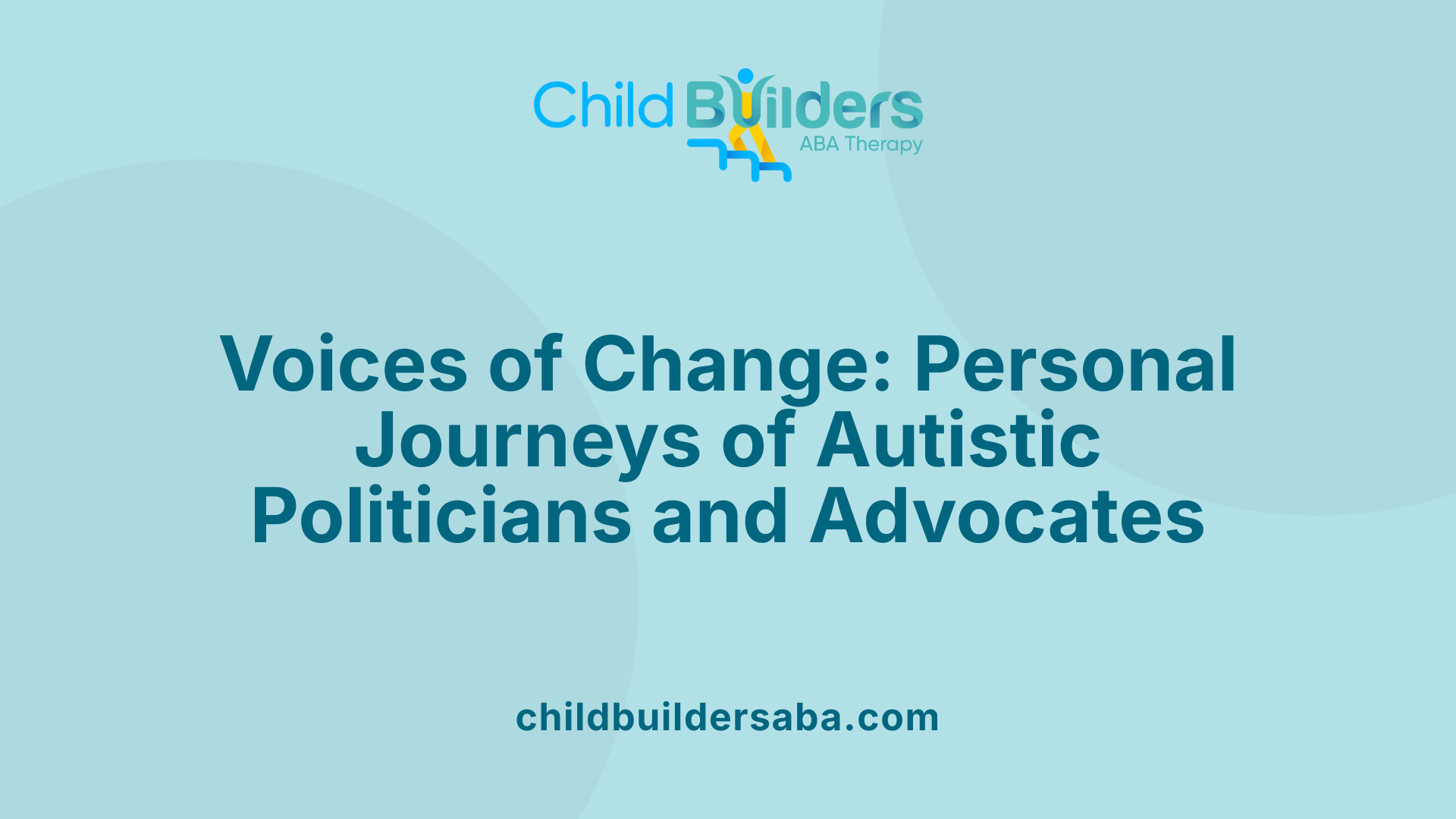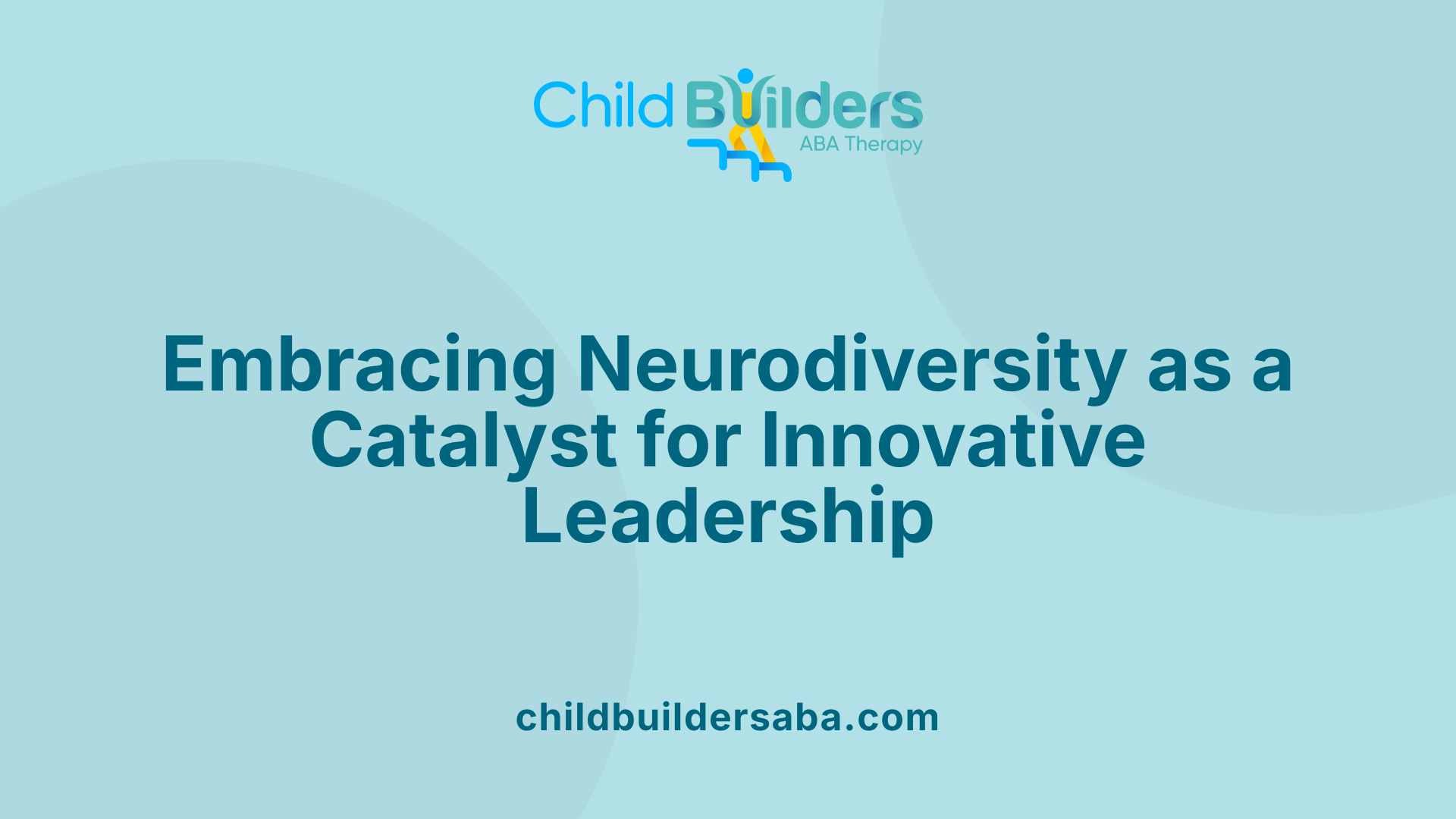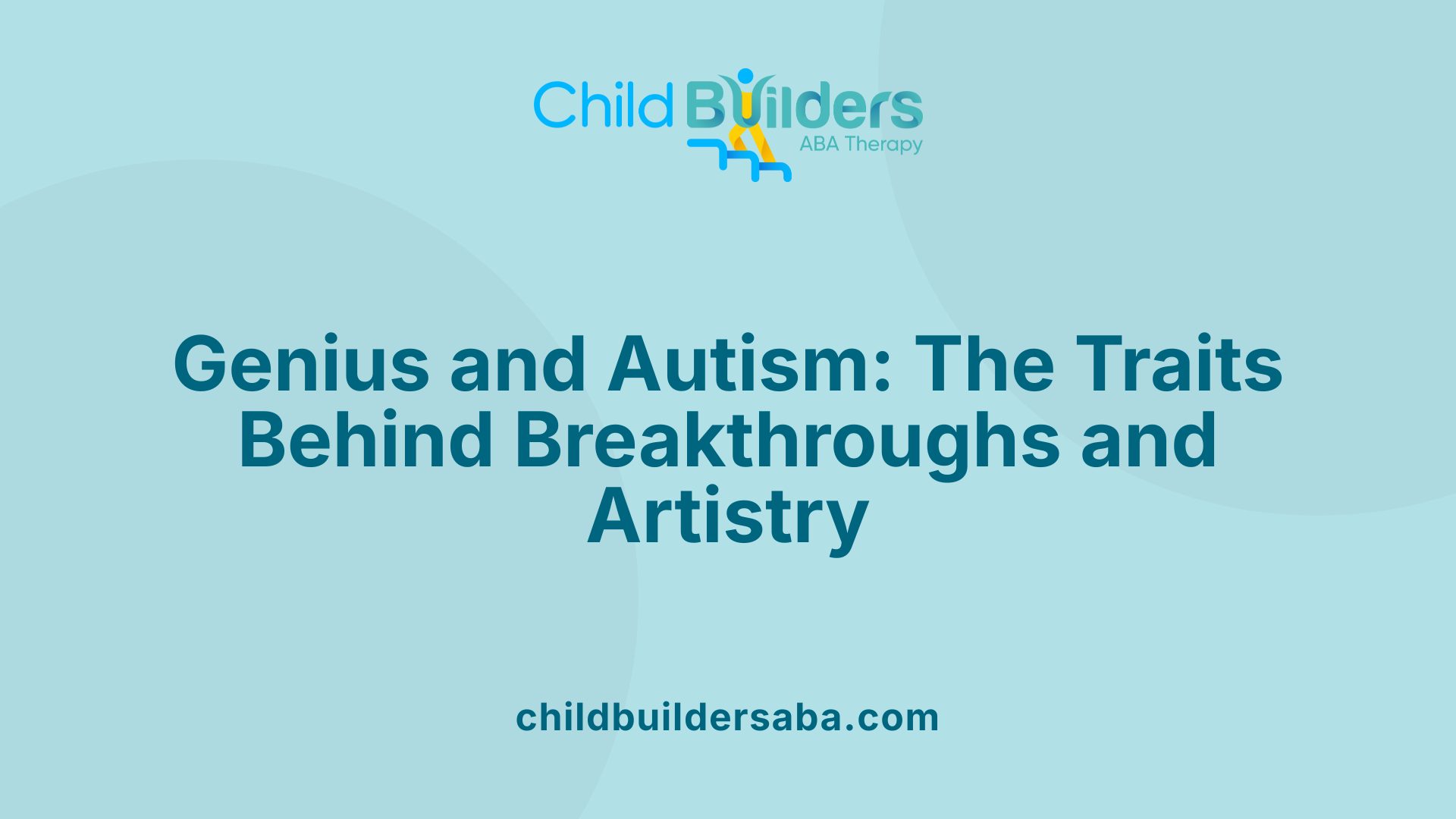Famous Politicians With Autism

Understanding Autism's Impact on Leadership and Society
Autism spectrum disorder (ASD) influences a diverse range of individuals, including some who have risen to prominent political roles. Recognizing the traits and achievements of autistic politicians refines our understanding of neurodiversity, challenges stereotypes, and highlights the importance of inclusivity. This article explores the stories, traits, and successes of well-known figures with autism in the political arena and beyond, illustrating how their unique perspectives contribute to societal progress.
Notable Political Figures with Autism
Can you provide examples of notable politicians with autism?
One prominent example is Jessica Benham, an American politician and advocate for disability rights. She serves in the Pennsylvania House of Representatives representing the 36th District.
Jessica Benham is notably the first openly autistic person elected to the Pennsylvania General Assembly. Her election marked a significant milestone, as she openly discusses her autism diagnosis and advocates for increased awareness and support for autistic individuals.
Beyond her political career, Benham co-founded the Pittsburgh Center for Autistic Advocacy, emphasizing her dedication to improving the lives of autistic people.
Her presence in politics helps challenge stereotypes and demonstrates that individuals with autism can excel in leadership roles.
While cases of publicly disclosed autism among politicians are still relatively rare, Jessica Benham’s success underscores how representation is growing.
Her story inspires many, showing that with perseverance and advocacy, people with autism can achieve significant milestones in public service.
| Politician | Position | Notable Traits/Impact | Remarks |
|---|---|---|---|
| Jessica Benham | Member of Pennsylvania House | Elected openly autistic, queer advocate | First autistic member in PA legislature, activism advocate |
Her achievements serve as a powerful example and continue to inspire more inclusive representation in government.
Manifestations of Autism in Public Figures

How does autism manifest in well-known personalities?
Autism reveals itself in various ways among admired public figures, often blending unique traits with exceptional talents. Many individuals on the spectrum display a deep focus and attention to detail, which can lead to groundbreaking work. For instance, Temple Grandin's relentless focus on animal behavior enabled her to revolutionize livestock handling systems. Similarly, Stephen Wiltshire's extraordinary artistic memory allows him to create detailed cityscapes from memory.
Communication styles can also be distinctive. Some personalities, like Greta Thunberg and Dan Aykroyd, frankly share their experiences of feeling different or having social challenges, yet they harness these traits into powerful advocacy or artistic pursuits. Greta describes her Asperger's as her 'superpower,' helping her concentrate on climate issues, while Dan deepens his acting with his keen interests.
Sensory sensitivities and social difficulties are common traits. Anthony Hopkins has spoken about his nervous habits and sensory sensitivities, which aid him in deep role immersion. Susan Boyle also describes her Asperger’s diagnosis as a relief, providing clarity and understanding of her social challenges.
Interestingly, many of these personalities demonstrate that autism traits can be linked to significant skills and societal contributions. Their experiences show that differences in cognition and sensory perception often coincide with extraordinary creativity, persistence, and innovation.
| Personality | Traits Exhibited | Notable Achievements | How Traits Helped/Challenged Them |
|---|---|---|---|
| Temple Grandin | Deep focus, social difficulties, visual thinking | Innovations in animal handling system | Increased empathy for animals, scientific success |
| Greta Thunberg | Focused activism, social challenges | Global climate movement advocacy | Powerful voice for change, laser-like attention to issues |
| Stephen Wiltshire | Artistic savant, intense focus | Creating detailed cityscapes from memory | Demonstrates extraordinary talent, social challenges |
| Anthony Hopkins | Sensory sensitivities, nervous habits | Acclaimed acting career | Deep role immersion, creative expression |
| Susan Boyle | Reclusiveness, social challenges | International singing success | Talent overcoming personal hurdles |
These stories exemplify how autism can influence a person’s life, often providing unique perspectives and skills. Although challenges are present, many individuals turn their traits into strengths that inspire others. Their lives demonstrate the possibility of achieving greatness while embracing neurodiversity.
Achievements of Autistic Personalities in Different Fields
How are autism traits linked to success stories across various fields?
Many well-known individuals with autism or related traits have achieved great success, showing that autism can often be associated with extraordinary talents in science, art, technology, and activism. Traits such as intense focus, vivid memory, and perseverance have played a significant role in their accomplishments.
For example, Temple Grandin, diagnosed with autism early in life, revolutionized animal welfare with her innovative designs and understanding of animal behavior. Her ability to think in pictures and her deep focus enabled her to develop humane livestock systems. Similarly, Greta Thunberg, who openly states she has Asperger’s syndrome, leverages her heightened focus and passion to drive global climate change awareness.
In the realm of innovation, Elon Musk, also diagnosed with Asperger’s, credits his different way of thinking for transforming industries with Tesla and SpaceX. His literal approach to language and relentless focus enable him to tackle complex problems.
What are some examples of creative contributions and innovations?
Many with autism traits have made groundbreaking contributions in both arts and sciences. Stephen Wiltshire, a talented autistic savant, can create detailed cityscape illustrations from memory, demonstrating extraordinary visual-spatial skills. Satoshi Tajiri, creator of Pokémon, combined childhood fascination with bugs and pattern recognition skills to craft a worldwide franchise.
In music and film, Tim Burton’s unique storytelling style and commitment to detail reflect traits often linked to autism, such as intense focus and passion for his work. Actor Anthony Hopkins’ ability to deeply immerse himself in roles and memorize scripts is partly attributed to his autism-related traits.
How does focus, memory, and perseverance contribute to their success?
Traits like focus and perseverance are common among these individuals and help them excel even in challenging circumstances. Susan Boyle found solace and success in her singing career after her autism diagnosis, showing how talent and perseverance can overcome personal obstacles.
Behavioral traits such as detailed memory—seen in Leonardo da Vinci and Wolfgang Amadeus Mozart—contribute to their mastery and originality. These qualities often lead to innovations, artistic masterpieces, and scientific discoveries, underlining how neurodiversity can be a powerful advantage.
| Person | Field | Autism Traits | Notable Achievements | Additional Details |
|---|---|---|---|---|
| Temple Grandin | Animal Science | Visual thinking, focus | Designing humane livestock systems | Advocates for autism awareness |
| Elon Musk | Technology | Literal thinking, focus | Electric cars, space exploration | Shares his autism diagnosis openly |
| Stephen Wiltshire | Art | Visual-sensory memory | Cityscape illustrations | Iconic autistic savant |
| Greta Thunberg | Activism | Focus, passion | Climate change awareness | Considers autism a 'superpower' |
| Anthony Hopkins | Acting | Deep focus, memorization | Oscars and acclaimed roles | Diagnosed later in life |
What does this tell us about the relationship between autism and achievement?
The successes of these public figures demonstrate that traits associated with autism, such as intense focus, memory, and perseverance, can be harnessed to achieve extraordinary goals. These stories serve as an inspiring reminder that neurodiversity enriches our world and fosters innovative thinking across disciplines.
Historical Figures Believed to Have Been on the Spectrum
 Many individuals from history and recent times may have exhibited traits consistent with autism spectrum disorder (ASD), although not all were formally diagnosed, especially given the historical context.
Many individuals from history and recent times may have exhibited traits consistent with autism spectrum disorder (ASD), although not all were formally diagnosed, especially given the historical context.
People like Albert Einstein, the renowned physicist, displayed traits such as delayed speech development, social difficulties, and intense focus, all of which are associated with autism. Similarly, Emily Dickinson, the pioneering poet, showed signs of reclusiveness and unconventional social interactions. The famous artist and storyteller, Andy Warhol, demonstrated a love for repetition, routines, and social withdrawal, traits often linked to autism.
Biographical indicators provide hints about autism in many notable figures. For example, Sir Isaac Newton was known for his social awkwardness and deep concentration, while Wolfgang Amadeus Mozart’s short attention span and sensitivity to noise are considered on the spectrum traits.
Historical accounts and personal diaries often reveal behaviors such as intense obsession with specific interests, difficulties in social interactions, and preference for routines. These are now recognized as characteristic features of ASD.
The following table highlights some historical and modern figures, their suspected traits, and how these traits relate to autism:
| Person | Notable Traits | Possible Autism Indicators | Additional Notes |
|---|---|---|---|
| Albert Einstein | Speech delays, focus on technical problems | Delayed speech, social difficulties, deep focus | Influenced groundbreaking physics, traits may have aided his work |
| Emily Dickinson | Reclusiveness, unconventional poetry | Preference for solitude, social difficulties | Her unique style may reflect autistic traits |
| Wolfgang Amadeus Mozart | Short attention span, sensitivity to loud noises | Repetitive behaviors, sensory sensitivities | Exhibited behaviors like doing cartwheels and meowing |
| Sir Isaac Newton | Social awkwardness, intense focus | Social withdrawal, obsessive work habits | Entirely absorbed in his scientific pursuits |
| Andy Warhol | Love of repetition, social withdrawal | Routine, monotone responses, social difficulties | His artistic style and reclusiveness suggest autistic traits |
| Charles Darwin | Fixations, quietness, communication style | Asymmetric social behaviors, focused interests | Possibly on the spectrum, contributed to evolutionary theory |
| Tim Burton | Passion for art, social difficulties | Application, dedication, social challenges | Traits believed to be characteristic of autism |
In recent times, many influential figures have openly acknowledged their autism diagnoses, highlighting how neurodiversity can be a source of strength.
| Person | Disorder Diagnosed | Traits or Comments | Influence on Life and Work |
|---|---|---|---|
| Greta Thunberg | Asperger’s syndrome | Describes her diagnosis as her 'superpower' | Uses her focus to raise awareness about climate change |
| Anthony Hopkins | Asperger’s syndrome | Finds that it helps him memorize scripts and inhabit characters | An acclaimed actor who utilizes his traits creatively |
| Sia | Autism spectrum | Feels more genuine embracing her condition | Influences her songwriting and performances |
| Elon Musk | Asperger’s syndrome | Describes his literal thinking and social cues challenges | Drives his innovative, problem-solving approach |
| Susan Boyle | Asperger’s syndrome | Felt relief after diagnosis, continues her singing career | Inspirational figure overcoming personal challenges |
The recognition of autism’s influence across diverse fields underscores its role in fostering unique talents and perspectives. Many of these individuals see their traits not as limitations, but as features that have helped them excel in their pursuits.
Personal Stories of Autistic Politicians and Activists
 Many autistic politicians and advocates openly share their personal journeys, significantly contributing to the movement for neurodiversity and systemic change.
Many autistic politicians and advocates openly share their personal journeys, significantly contributing to the movement for neurodiversity and systemic change.
Eric M. Garcia is one example; as an autistic reporter and policy advocate, he emphasizes authentic representation of autistic voices in media and policymaking. His experiences challenge stereotypes and highlight the importance of acceptance and civil rights, framing autism not as a disorder to be cured but as a valued aspect of identity.
Ari Ne’eman is another notable figure whose advocacy has shaped the neurodiversity movement. He emphasizes that autism encompasses a broad spectrum of experiences and promotes systemic reforms to improve accessibility and support. His personal narrative and leadership have fostered greater societal understanding and acceptance.
These stories serve more than just inspiration; they serve as tools for education and awareness. Personal triumphs and struggles shared publicly help combat misconceptions, making space for wider societal inclusion.
By engaging with these narratives, the public gains a deeper understanding of the strengths and challenges faced by neurodiverse individuals. The voices of autistic advocates help shift the conversation from viewing autism solely as a clinical condition to recognizing it as part of human diversity that should be embraced.
| Person | Role | Impact | Notable Contributions |
|---|---|---|---|
| Eric M. Garcia | Journalist & Policy Advocate | Promotes authentic autistic representation | Advocated for civil rights and media diversity |
| Ari Ne’eman | Neurodiversity Activist | Emphasized the value of autism as identity | Helped shape societal and policy reforms |
| Others | Various roles in advocacy | Raise awareness, challenge stereotypes | Paid tribute to personal experiences influencing change |
Such stories serve not only to educate but also to inspire systemic change by highlighting the potential and diversity of autistic individuals. They demonstrate how personal narratives can impact policy, foster acceptance, and empower others on the spectrum to be proud of their identities.
Autism's Role in Creative & Scientific Innovation
How does autism manifest in well-known personalities?
Autism manifests in well-known personalities through diverse traits that reflect their unique cognitive and sensory experiences. Many exhibit intense focus and attention to detail, as seen in Temple Grandin's work in animal science or Stephen Wiltshire's remarkable artistic memory.
Communication styles may be distinctive, with some individuals, like Greta Thunberg and Dan Aykroyd, openly discussing their experiences of feeling different or socially challenged, yet channeling these traits into advocacy or creative success.
Sensory sensitivities and difficulties with social cues are also common, exemplified by Anthony Hopkins and Susan Boyle, who have spoken about their challenges and how diagnosis has helped them understand themselves.
Overall, while manifestations vary, these personalities demonstrate that traits associated with autism can correlate with extraordinary talents and impactful contributions to society.
How do autistic traits foster innovation?
Traits such as intense focus, perseverance, and hyper-specific interests enable many autistic individuals to excel in their fields. Their ability to concentrate deeply on passions allows for groundbreaking discoveries and creative works. For example, Satoshi Tajiri’s fascination with bugs and pattern recognition was essential in designing Pokémon.
Autistic individuals often approach problems differently, leading to innovative solutions and new ways of thinking. Elon Musk’s literal-mindedness and problem-solving mindset have driven advances in technology through Tesla and SpaceX.
Examples of scientific and artistic breakthroughs
Many achievers have made memorable contributions thanks to their autism-related traits. Albert Einstein’s delayed speech and deep curiosity were connected to his revolutionary theories in physics. Stephen Wiltshire’s artistic memory, imaging landscapes after brief observations, created some of the world’s most detailed cityscapes. Greta Thunberg’s unwavering dedication and focus rallying global climate action exemplify how autistic traits can fuel impactful activism.
The importance of focus and perseverance
Persistent focus and resilience are crucial for success. Individuals like Temple Grandin, who developed humane livestock systems, show that unwavering dedication can lead to transformative innovations. Many of these figures faced misunderstandings but turned personal traits into strengths, proving that perseverance is vital for breakthroughs.
| Personality | Traits | Achievements | Notable Features |
|---|---|---|---|
| Albert Einstein | Delayed speech, technical focus | General theory of relativity | Deep curiosity, perseverance |
| Temple Grandin | Visual thinker, social challenges | Animal welfare innovations | Advocacy, unique cognition |
| Greta Thunberg | Dedication, social difficulty | Climate activism global impact | Focused passion, advocacy |
| Satoshi Tajiri | Pattern recognition, fascination with bugs | Pokémon franchise | Creativity, detailed interests |
| Stephen Wiltshire | Artistic memory, detail orientation | Skylines and landscapes drawings | Visual thinking, focus |
This pattern of traits illustrates how autism-related characteristics have contributed significantly across diverse fields, driving innovation and artistic excellence.
The Significance of Neurodiversity in Leadership
 Autism spectrum traits are increasingly recognized as strengths in various leadership roles, bringing unique perspectives and problem-solving abilities.
Autism spectrum traits are increasingly recognized as strengths in various leadership roles, bringing unique perspectives and problem-solving abilities.
Many prominent figures, both historical and contemporary, exemplify how traits associated with autism can facilitate extraordinary accomplishments.
For instance, Temple Grandin, a renowned advocate and expert in animal behavior, developed innovative livestock systems and became a vocal proponent for autism awareness. Her ability to think in pictures and focus intensely on details has been instrumental in her contributions.
Climate activist Greta Thunberg openly shares her diagnosis of Asperger’s syndrome, which she credits as her 'superpower' that helps her concentrate on climate issues and communicate effectively on a global stage.
In technology and innovation, Elon Musk has spoken about his Asperger’s diagnosis, highlighting how his different brain wiring enables him to approach problems uniquely. His visionary work with Tesla and SpaceX demonstrates how neurodiversity can drive groundbreaking progress.
Other influential figures include actor Anthony Hopkins, who was diagnosed later in life and states that his traits facilitate deep focus and memorization, essential in his craft. Similarly, physicist Albert Einstein displayed behaviors like delayed speech and intense focus, traits that some researchers now associate with autism spectrum disorder.
The influence of neurodiverse leaders extends beyond individual achievements. Their visibility fosters a broader understanding of neurodiversity and promotes an inclusive approach in various fields.
In summary, their stories emphasize that traits linked with autism—such as intense focus, creativity, and perseverance—are valuable assets in leadership roles, and they challenge societal notions about what it means to succeed.
How Neurodiversity Enhances Decision-Making
Neurodiverse individuals often demonstrate unique thinking patterns, such as innovative problem-solving and high attention to detail, enriching decision-making processes.
The Societal Benefits of Inclusive Leadership
Harnessing the talents of neurodiverse leaders fosters diverse perspectives, promotes innovation, and creates a more accepting society that values differences as strengths.
Raising Awareness and Promoting Neurodiversity in Politics
How do prominent figures with autism influence public understanding?
Many influential individuals across various fields have openly discussed their autism, helping to reshape societal perceptions. For example, Albert Einstein, with traits such as delayed speech and intense focus, is believed to have had autistic tendencies that contributed to his groundbreaking scientific achievements. Similarly, Sir Isaac Newton displayed signs like social avoidance and rigid routines, traits often associated with autism, enabling his remarkable discoveries.
Celebrated advocates like Temple Grandin, who was diagnosed with autism as a child, have used their experiences to educate others. Grandin's ability to think visually led her to design humane livestock systems, demonstrating how autistic traits can be strengths.
Other notable figures include Greta Thunberg, who describes her Asperger’s as her 'superpower' that sharpens her focus on climate change issues. Elon Musk publicly shares his Asperger’s diagnosis, which influences his innovative problem-solving approach. Actors like Dan Aykroyd and Susan Boyle have spoken openly about their autism diagnoses, inspiring others with their talents and perseverance.
Campaigns and initiatives promoting neurodiversity
Awareness campaigns often feature influential figures, creating a broader conversation on acceptance. Organizations like the Autism Self Advocacy Network and neurodiversity movements focus on recognizing autism as a natural variation rather than a defect. Key campaigns include Education for All and Neurodiversity in the Workplace, which encourage inclusive policies.
Events such as Autism Awareness Month and public panels often include stories from celebrities and leaders with autism, fostering understanding. Media portrayals and documentaries further emphasize the value of neurodiverse individuals in society.
Why representation matters for societal change
Showcasing successful individuals with autism helps challenge stereotypes and reduce stigma. When leaders like Greta Thunberg or Elon Musk openly discuss their experiences, it normalizes neurodiversity. These stories inspire young people on the spectrum and promote policies that support their needs.
Representation also impacts policy development, encouraging governments to implement inclusive education, employment support, and accessible healthcare. The visibility of diverse role models broadens societal acceptance and exemplifies how differences can lead to innovation and progress.
| Notable Autistic Figures | Field of Influence | Traits and Contributions | Their Impact on Society |
|---|---|---|---|
| Albert Einstein | Physics | Delayed speech, focus | Revolutionary scientific ideas |
| Temple Grandin | Animal Behavior | Visual thinking, empathy | Improved livestock welfare |
| Greta Thunberg | Climate Activism | Focused, determined | Global climate awareness |
| Elon Musk | Business and Tech | Problem-solving, innovation | Pioneer of electric vehicles and space tech |
| Susan Boyle | Music | Perseverance, talent | Inspiring artists managing neurodiversity |
| Dan Aykroyd | Entertainment | Fascination with supernatural | Broadened awareness through comedy |
Understanding these stories and promoting inclusive initiatives encourages a society that values diverse minds. Recognizing how neurodiverse individuals contribute innovatively in science, arts, activism, and business fosters a more accepting, accommodating world.
Biographical Focus: Autism Traits in Scientific and Artistic Geniuses
 Many eminent figures in history and contemporary times exhibit traits associated with autism spectrum disorder, such as intense focus, the development of routines, obsessive interests, and social difficulties. These traits, while sometimes challenging, often contributed to their groundbreaking work and creative achievements.
Many eminent figures in history and contemporary times exhibit traits associated with autism spectrum disorder, such as intense focus, the development of routines, obsessive interests, and social difficulties. These traits, while sometimes challenging, often contributed to their groundbreaking work and creative achievements.
Historical figures like Albert Einstein are believed to have shown signs of autism, including delayed speech, echolalia, and a propensity for technical thinking. Similarly, Emily Dickinson exhibited reclusiveness and unconventional poetry, which some scholars interpret as signs of autistic traits. Artists such as Michelangelo displayed intense passion for their work, routines, and occasional temperaments, aligning with high-functioning autism characteristics.
In the modern era, many notable individuals openly discuss their autism diagnosis and how it influences their careers. Actor Anthony Hopkins, diagnosed later in life, describes his autism as a source of focus that aids in memorization and role immersion. Actor Dan Aykroyd, diagnosed with Asperger’s syndrome, has shared his obsessions with ghosts and law enforcement as inspirations for his comedy and acting.
Similarly, violinist and singer Susan Boyle, diagnosed with Asperger’s, feels that understanding her condition has helped her cultivate her talent and overcome feelings of being an outsider. Tech entrepreneurs like Elon Musk openly state he has Asperger’s, noting how traits like literal thinking and social difficulties foster innovation.
This pattern is also evident among younger personalities, such as Greta Thunberg, who calls her Asperger’s a 'superpower,' helping her focus on climate activism with unwavering dedication. The collective narratives of these individuals demonstrate that autism traits can serve as strengths that propel creative and scientific breakthroughs.
| Name | Field | Autism Traits | Impact on Work | Notable Remarks |
|---|---|---|---|---|
| Albert Einstein | Physics | Delayed speech, focus on technical details | Groundbreaking theories | Possibly autistic, based on traits |
| Emily Dickinson | Poetry | Reclusiveness, obsession with themes | Unique poetic voice | Believed to display autistic traits |
| Anthony Hopkins | Acting | Focused, memorization skills | Deep immersion in roles | Diagnosed later in life |
| Greta Thunberg | Climate activism | Intense focus, social challenges | Global awareness | Calls autism her 'superpower' |
| Elon Musk | Technology | Literal interpretation, social difficulties | Innovation in tech | Shares his autism diagnosis openly |
| Susan Boyle | Singing | Social difficulties, obsession with singing | Inspirational talent | Feels relief after diagnosis |
| Michelangelo | Art | Passion, routines, temper | Masterpieces of Renaissance | Exhibited traits consistent with autism |
This overview illustrates the diverse ways autism traits have manifested in individuals across different domains. Their stories highlight how focus, routines, obsessions, and social differences can contribute significantly to their achievements and legacies.
Embracing Neurodiversity in Leadership and Society
The stories of autistic individuals in politics, science, arts, and activism serve as powerful reminders that neurodiversity is a vital part of human innovation and progress. Their achievements and personal narratives challenge outdated perceptions and demonstrate that autism can be a source of extraordinary talent and insight. Recognizing and celebrating this diversity fosters a more inclusive society where everyone’s unique strengths are valued. As awareness grows, more autistic voices will shape policies, inspire future generations, and lead us toward a more understanding and equitable world.
References
- Ten Famous People with Autism Who Inspire the World
- 20 Famous People With Autism - Autism Parenting Magazine
- History's 30 Most Famous People with Autism
- 9 Famous People Who Have Autism - Everyday Health
- Autistic celebrities: 71 famous people with autism (2023 edition)
- Inspiring Famous People with Autism | Inclusive ABA
- 10 Inspiring Public Figures With Autism | All Star ABA
























.jpg)












































































